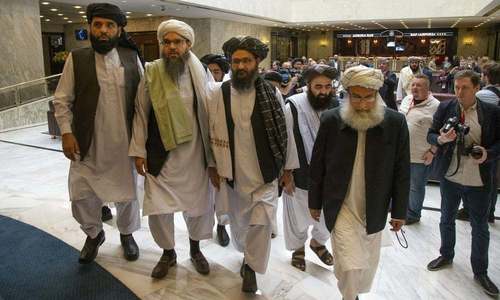KABUL: The Afghan government expressed doubts on Wednesday about a prospective deal between the US and the Taliban, saying officials need more information about the risks it poses.
US special envoy Zalmay Khalilzad was in Kabul this week, when he shared with Afghan officials an agreement “in principle” that Washington has forged with the Taliban and would lead to a pullout of American troops.
The prospect of a US-Taliban deal has caused much concern among many Afghans, who feel sidelined from the process, worry the hardline Islamists will return to power, and see a beaten America selling out their interests in a bid to escape Afghanistan after 18 years of gruelling war.
Sediq Sediqqi, Afghan President Ashraf Ghani’s spokesman, said that while the Kabul administration supports any progress in an eventual peace process, it wants to prevent any negative consequences.
Kabul is “concerned, therefore we seek clarification about this document so that we can carefully analyse the risks and potential negative consequences, and prevent any danger it may cause”, Sediqqi said on Twitter.
The statement is Kabul’s first reaction to the prospective deal, which Khalilzad presented on Monday.
Ghani and his government have until now been largely sidelined in negotiations between the US and the Taliban, who see the Afghan president as illegitimate and have insisted on dealing first with the Americans.
Five US bases
According to parts of the deal made public so far, the Pentagon would pull thousands of its 13,000 or so troops from five bases across Afghanistan by early next year, provided the Taliban stick to their security pledges.
The militants have said they will renounce Al Qaeda, fight the militant Islamic State group and stop jihadists using Afghanistan as a safe haven.
Ultimately, though, Kabul has no say on whether the US and the Taliban make a deal, and can only hope the insurgents honour a pledge to sit down with the Afghan government to forge a separate accord.
Afghans have been on tenterhooks for weeks while the US and the Taliban flesh out what are thought to be the final details of their deal.
President Donald Trump was due to look at the proposed pact this week. If he and Taliban leaders approve, it could be signed and announced any day.
But even as negotiations for an accord have entered an apparent end phase, violence has surged across Afghanistan.
On Monday, the Taliban launched a massive attack in Kabul, where they targeted a fortified compound used by foreign aid groups and agencies. At least 16 people were killed, with more than 100 wounded.
On Saturday, the Taliban attempted to seize the provincial capital of Kunduz in the north, and on Sunday they launched an operation in the city of Pul-e-Khumri, the capital of neighbouring Baghlan province.
A post-deal US security presence in Afghanistan would mean less uniformed regular military troops and more focus on special forces, CIA paramilitary units, intelligence collectors and analysts, and air support.
Michael O’Hanlon, a senior fellow at the Brookings Institution, suggests that the US and allies could still need to have 3,000 to 6,000 people on the ground, dispersed based on the location of threats, surveillance demands and air support operations.
“I think that three or four large bases ... would roughly do it,” he said in an email. “If you think of 1,000 to 1,500 people per base in rough numbers that gives a sense of the needed scale,” he said.
Published in Dawn, September 5th, 2019














































